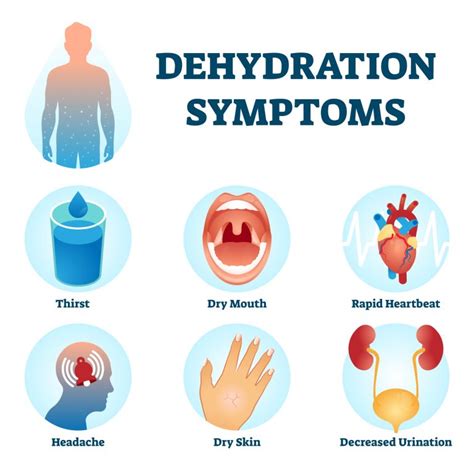Pro Tip: 5 Steps To Alleviate Abdominal Pain From Dehydration Now

Dehydration is a common issue that can lead to various health problems, including abdominal pain. If you're experiencing discomfort in your stomach due to dehydration, it's essential to take immediate action to relieve the pain and rehydrate your body. Here are five steps you can follow to alleviate abdominal pain caused by dehydration and promote a speedy recovery.
1. Recognize the Symptoms

Before taking any action, it's crucial to identify whether your abdominal pain is indeed a result of dehydration. Some common symptoms of dehydration include:
- Increased thirst
- Dark-colored urine
- Dry mouth, skin, and eyes
- Fatigue and dizziness
- Headache
- Decreased urine output
- Rapid heartbeat
If you experience any of these symptoms along with abdominal pain, it's likely that dehydration is the culprit. Pay attention to your body's signals and take prompt action to rehydrate.
2. Rehydrate with Fluids

The most effective way to alleviate abdominal pain from dehydration is to replenish your body's fluid levels. Drink plenty of water or other hydrating fluids. Here are some options to consider:
- Water: Plain water is an excellent choice for rehydration. Aim to drink at least 8-10 glasses of water throughout the day. Carry a water bottle with you to ensure easy access.
- Oral Rehydration Solutions (ORS): ORS are specially formulated drinks that contain a balanced mix of salts and sugars. They help restore the body's electrolyte balance and are particularly beneficial for severe dehydration cases. You can find ORS packets at most pharmacies.
- Fruit Juices: Natural fruit juices, especially those high in potassium and sodium, can aid in rehydration. However, be cautious with store-bought juices that may contain added sugars. Opt for freshly squeezed juices or diluted options.
- Coconut Water: Coconut water is a natural source of electrolytes and is an excellent choice for rehydration. It's a refreshing and healthy option to replenish your body's fluids.
Avoid caffeinated and alcoholic beverages, as they can further dehydrate your body. Take small sips of fluids frequently throughout the day to ensure proper rehydration.
3. Rest and Relax

When experiencing abdominal pain due to dehydration, it's essential to give your body the rest it needs. Here's how you can promote relaxation and recovery:
- Find a comfortable position: Lie down in a position that feels most comfortable for your abdomen. Elevating your legs slightly can also help reduce pain and promote blood flow.
- Apply Heat: A warm compress or heating pad can provide relief to your abdomen. Heat helps relax the muscles and alleviate pain. Ensure the temperature is comfortable and avoid direct contact with hot surfaces.
- Meditate or Practice Deep Breathing: Stress and anxiety can worsen abdominal pain. Take some time to relax and practice deep breathing exercises. Meditation or mindfulness techniques can help calm your mind and reduce pain perception.
Remember, adequate rest is crucial for your body to recover and rehydrate effectively.
4. Eat Light and Hydrating Foods

In addition to fluids, certain foods can aid in rehydration and provide essential nutrients. Include the following in your diet:
- Fruits and Vegetables: Fresh fruits and vegetables are rich in water content and essential vitamins and minerals. Watermelon, cucumber, oranges, and leafy greens are excellent choices. Aim for a variety of colors to ensure a wide range of nutrients.
- Soups and Broths: Warm soups and broths can be comforting and hydrating. Opt for clear soups or broths made with vegetables and lean proteins. Avoid creamy or heavily seasoned soups that may irritate your stomach.
- Gelatin or Jell-O: Gelatin-based desserts like Jell-O contain water and can be a pleasant way to increase your fluid intake. Choose sugar-free options or make your own with natural sweeteners.
- Yogurt and Probiotics: Probiotic-rich foods like yogurt can support gut health and aid in digestion. Look for plain yogurt with live and active cultures, and avoid sugary varieties.
Avoid heavy, greasy, or spicy foods that may aggravate your stomach. Stick to light and easily digestible meals until your abdominal pain subsides.
5. Monitor and Prevent Dehydration

Once you've alleviated your abdominal pain, it's important to take preventive measures to avoid future episodes of dehydration. Here are some tips to stay hydrated and healthy:
- Drink Water Regularly: Make it a habit to drink water throughout the day, even when you're not thirsty. Carry a water bottle with you and set reminders if needed.
- Increase Fluid Intake During Physical Activity: When engaging in physical activities or exercising, ensure you're well-hydrated before, during, and after. Bring a water bottle with you and sip regularly.
- Monitor Urine Color: Pay attention to the color of your urine. Dark-colored urine is a sign of dehydration, while light-yellow urine indicates adequate hydration.
- Eat Water-Rich Foods: Include fruits and vegetables with high water content in your daily diet. This helps maintain your body's fluid balance.
- Avoid Excessive Caffeine and Alcohol: Both caffeine and alcohol have diuretic effects, which can lead to increased urine production and dehydration. Limit your intake, especially during hot weather or intense physical activities.
By following these steps and making hydration a priority, you can effectively alleviate abdominal pain from dehydration and prevent future occurrences.
Conclusion

Abdominal pain caused by dehydration can be uncomfortable and disruptive. However, by recognizing the symptoms, rehydrating with fluids and light meals, resting, and taking preventive measures, you can manage and alleviate the pain effectively. Remember, staying hydrated is crucial for your overall health and well-being. Make it a habit to listen to your body's signals and take prompt action when needed.
How much water should I drink daily to prevent dehydration?

+
The recommended daily water intake varies depending on factors such as age, gender, and activity level. As a general guideline, aim for at least 8-10 glasses of water per day. However, individual needs may vary, so it’s essential to listen to your body and adjust accordingly.
Can I use sports drinks instead of water for rehydration?

+
Sports drinks can be beneficial for rehydration, especially during intense physical activities. They contain electrolytes and carbohydrates that help replenish lost fluids and energy. However, for mild dehydration, plain water is usually sufficient. Reserve sports drinks for more demanding activities or consult with a healthcare professional for personalized advice.
What are some signs that my abdominal pain is not related to dehydration?

+
While dehydration is a common cause of abdominal pain, other factors may be at play. If your abdominal pain is accompanied by severe vomiting, blood in the stool, persistent fever, or sudden and intense pain, it’s essential to seek medical attention. These symptoms could indicate more serious conditions that require professional evaluation.


